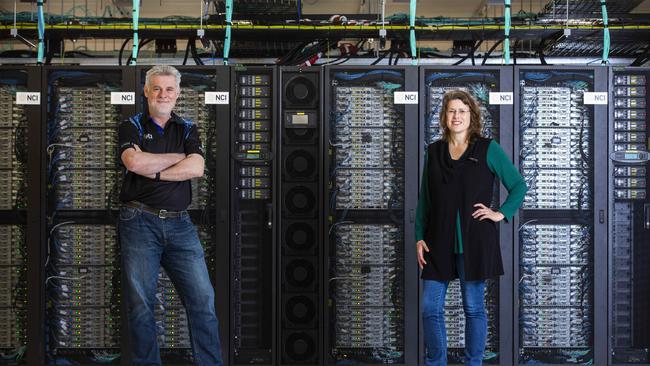Super Gadi joins search for ways to combat COVID-19
Australia is back in the supercomputer race with Gadi, the ANU’s new machine, ranked 25th in the world.

Gadi the supercomputer has propelled Australia back into the big league of data crunchers, coming fully online just in time to help Megan O’Mara’s research aimed at combating COVID-19.
The National Computational Infrastructure’s newly commissioned $70m facility was ranked 25 in the TOP500 list of the world’s most powerful commercially available computer systems, released on Tuesday.
Dr O’Mara’s research is an early beneficiary of that firepower. The Australian National University associate professor was collaborating with other ANU teams in medicinal chemistry and biochemistry on related work when the latest iteration of the coronavirus turned the world upside down.
READ MORE: Next job, research reform | High fees for social work degrees ‘crazy’ | Tehan plays reform roulette | What’s in the funding package? | Bewildered by the the changes
They quickly applied for an NCI grant and scored 15 million hours on the supercomputer — that is, the cluster of computers that are connected so they can work together on calculations.
Gadi, which means “to search for” in the language of the Ngunnawal people, has 148,800 processor cores capable of performing more than nine quadrillion operations per second and will run 24 hours a day. In the case of Dr O’Mara’s research its grunt will reduce the time it takes to run the necessary simulations from 28½ years to about 15 months.
“I’m interested in how drugs are transported across the cell membrane and also how transport proteins in the cell membrane can be used as targets for pharmaceutical intervention,” Dr O’Mara said.
“So we were already working on one of these transport proteins that makes up part of the larger coronavirus receptor complex.”
The new work has been made possible because the crystal structure of the human receptor, together with part of the viral fragment for COVID-19, was published in January.
Dr O’Mara and the other researchers are simulating about 800,000 atoms that make up that receptor to discover how it allows the coronavirus to invade human cells. The aim is to shed light on which drugs may prevent that invasion.
The project is one of three that will use Gadi to further research to help fight COVID-19, but NCI, whose main collaborators are the ANU, the Bureau of Meteorology, CSIRO and Geoscience Australia, has more than 5000 organisations that want computing time.
Gadi is nine times more powerful than the supercomputer it has replaced, Raijin, which propelled Australia into the top 25 in 2012, and the most powerful in the southern hemisphere.
In the past six months Gadi has enabled the Garvan Institute to build, in the space of 24 hours, a dataset of 4012 human genomes for studies into cancer, diabetes and heart disease.
It also enabled the ARC Centre of Excellence for Climate Extremes to create a 400m resolution simulation of the weather for three of the days during 2017’s Cyclone Debbie.
Supercomputation is only part of the story, NCI director Sean Smith said. “Besides the big computer brain, which Gadi is, there are the massive data sets that we hold at NCI,” Professor Smith said.
“There are both individual user project data and data collections, which are utilised right across the community. So there are the big satellite imaging datasets, the climate and weather data sets, the genomics data sets.
“These account for huge amounts of storage. And it is the combination of the big brain and the access to the data which allows NCI to do what it does for the country.”




To join the conversation, please log in. Don't have an account? Register
Join the conversation, you are commenting as Logout